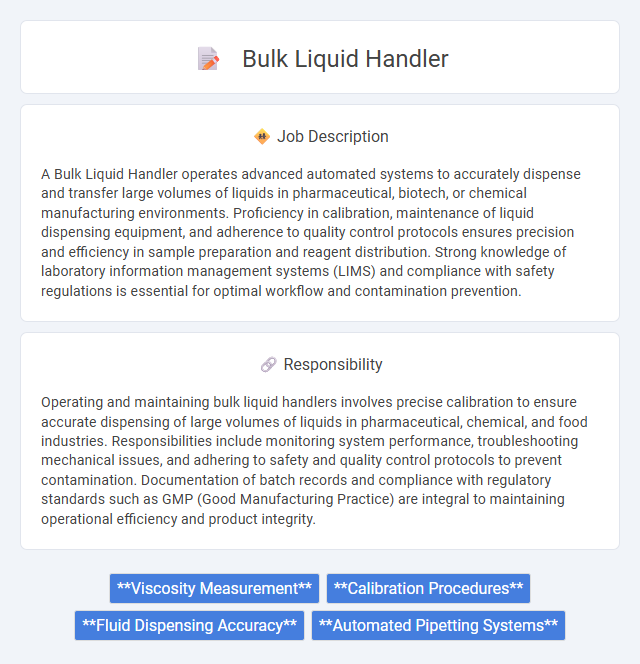
A Bulk Liquid Handler operates advanced automated systems to accurately dispense and transfer large volumes of liquids in pharmaceutical, biotech, or chemical manufacturing environments. Proficiency in calibration, maintenance of liquid dispensing equipment, and adherence to quality control protocols ensures precision and efficiency in sample preparation and reagent distribution. Strong knowledge of laboratory information management systems (LIMS) and compliance with safety regulations is essential for optimal workflow and contamination prevention.
People with strong attention to detail and good hand-eye coordination are likely suitable for a bulk liquid handler job, as precision in measuring and transferring liquids is critical. Those who can stand for extended periods and follow strict safety protocols will probably perform well in this role. Individuals with sensitivity to repetitive tasks or exposure to chemicals might find this job challenging.
Qualification
A Bulk Liquid Handler position requires a candidate with a high school diploma or equivalent, though specialized training in laboratory techniques or chemical handling is preferred. Proficiency in operating automated liquid handling systems and knowledge of safety protocols for managing hazardous materials are critical qualifications. Strong attention to detail, basic computer skills for data logging, and the ability to follow precise instructions ensure accuracy and efficiency in sample preparation and processing tasks.
Responsibility
Operating and maintaining bulk liquid handlers involves precise calibration to ensure accurate dispensing of large volumes of liquids in pharmaceutical, chemical, and food industries. Responsibilities include monitoring system performance, troubleshooting mechanical issues, and adhering to safety and quality control protocols to prevent contamination. Documentation of batch records and compliance with regulatory standards such as GMP (Good Manufacturing Practice) are integral to maintaining operational efficiency and product integrity.
Benefit
Working as a bulk liquid handler likely offers the benefit of gaining hands-on experience with automated systems designed for precise liquid measurement and transfer, boosting technical skills highly valued in pharmaceutical and biotech industries. It probably involves exposure to quality control and safety protocols, enhancing attention to detail and compliance knowledge. This role could also improve career prospects by providing experience in a specialized, technical field with consistent demand.
Challenge
Working as a bulk liquid handler likely involves managing complex workflows that require precise calibration and consistent accuracy to prevent costly errors. Operators probably face challenges related to handling a variety of liquid viscosities and volumes while maintaining contamination-free environments. The role may demand quick troubleshooting skills to address equipment malfunctions and ensure seamless production continuity.
Career Advancement
Working as a Bulk Liquid Handler offers significant career advancement opportunities within the pharmaceutical, chemical, and food processing industries. Professionals can progress to supervisory roles, quality control analyst positions, or specialized technician roles by gaining experience in automated liquid handling systems and mastering safety protocols. Continuous training and certification in laboratory automation and process optimization enhance prospects for leadership positions and higher salary brackets.
Key Terms
Viscosity Measurement
Bulk liquid handler jobs often require precise viscosity measurement to ensure accurate fluid dispensing and process consistency. Advanced viscometers integrated with bulk liquid handling systems provide real-time data, enabling adjustments that maintain optimal flow rates and reduce errors. Mastery of viscosity measurement techniques enhances the reliability of automation in pharmaceutical, chemical, and food industries.
Calibration Procedures
Calibration procedures for bulk liquid handlers involve precise adjustment of the device to ensure accurate volume dispensing, critical in pharmaceutical and laboratory settings. Regular calibration uses gravimetric or photometric methods to verify and adjust dispensing accuracy, maintaining compliance with industry standards such as ISO 8655. Proper calibration minimizes measurement errors, ensuring consistent sample handling and enhancing overall experimental reliability.
Fluid Dispensing Accuracy
Bulk liquid handler roles demand exceptional fluid dispensing accuracy to ensure precise reagent delivery and maintain experimental integrity. Advanced calibration techniques and real-time monitoring systems are utilized to minimize volume variability, achieving accuracy within microliter tolerances. This precision directly impacts reproducibility in high-throughput screening and pharmaceutical manufacturing processes.
Automated Pipetting Systems
Automated pipetting systems play a crucial role in bulk liquid handler jobs by increasing precision and throughput in sample preparation and reagent dispensing. These systems utilize robotic arms and advanced software algorithms to perform repetitive pipetting tasks with exceptional accuracy, reducing human error and contamination risks. Integration with laboratory information management systems (LIMS) enhances workflow efficiency, ensuring consistent data quality in high-volume liquid handling applications.
 kuljobs.com
kuljobs.com